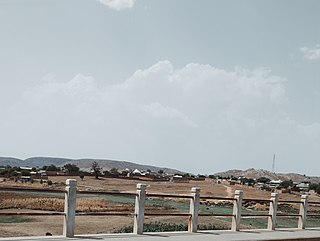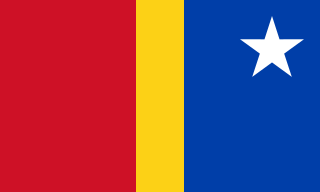| Sulimanu | |
|---|---|
| Sarkin Kano | |
| Reign | 1807-1819 |
| Predecessor | Muhammad Alwali |
| Successor | Ibrahim Dabo |
| House | Dabo Dynasty |
| Father | Abahama |
| Mother | Adama Modi |
Sulaimanu (or Suleiman) ![]() pronunciation was an Emir of Kano who reigned from 1807 to 1819. [1] [2]
pronunciation was an Emir of Kano who reigned from 1807 to 1819. [1] [2]
| Sulimanu | |
|---|---|
| Sarkin Kano | |
| Reign | 1807-1819 |
| Predecessor | Muhammad Alwali |
| Successor | Ibrahim Dabo |
| House | Dabo Dynasty |
| Father | Abahama |
| Mother | Adama Modi |
Sulaimanu (or Suleiman) ![]() pronunciation was an Emir of Kano who reigned from 1807 to 1819. [1] [2]
pronunciation was an Emir of Kano who reigned from 1807 to 1819. [1] [2]
Below is a biography of Sulaimanu from Palmer's 1908 English translation of the Kano Chronicle . [2]
The 44th Sarki was Sulimanu, son of Abahama, a Fulani. His mother's name was Adama Modi. When he became Sarkin Kano, the Fulani prevented him from entering the palace. He went into the house of Sarkin Dawaki's mother. One of the remaining Kanawa said to Sulimanu, "If you do not enter the Giddan Rimfa, you will not really be the Sarki of city and country."
When Sulimanu heard this he called the chief Fulani, but they refused to answer his summons, and said, "We will not come to you. You must come to us, though you be the Sarki. If you will come to Mallam Jibbrim's house we will assemble there."
Sulimanu went to Jibbrim's house and called them there. When they had assembled, he asked them and said, "Why do you prevent me entering the Giddan Rimfa?"
Mallam Jibbrim said, "If we enter the Habe's houses and we beget children, they will be like these Habes and do like them."
Sulimanu said nothing but set off to Shehu-Osuman Dan Hodio asking to be allowed to enter the Giddan Rimfa. Shehu Dan Hodio gave him a sword and a knife, [3] and gave him leave to enter the Giddan Rimfa, telling him to kill all who opposed him. He entered the house, and lived there. All the Kano towns submitted to him, except Faggam, which he attacked. He took many spoils there. On his way back to Kano the chiefs of the Fulani said to him, "If you leave Faggam alone, it will revolt."
So he divided it into two, and returned home. In his time Dabo Dan Bazzo raised a revolt. He dared to look for a wife in Sokoto and was given one. Sarkin Kano said, "What do you mean by looking for a wife at Sokoto?"
So Dabo was caught and bound. His relations the Danbazzawa, however, came by night and cut his bonds, and set him free. He ran to Sokoto with Sulimanu following him. At Sokoto they both went before Dan Hodio. Dabo Dan Bazzo said, "I do not wish to marry your daughters, but I wish for a reconciliation between myself and your Sarki Sulimanu."
So a reconciliation was made and they returned to Kano. Sulimanu sent the Galadima Ibrahima to Zaria to make war. Ibrahima conquered Zaria and took many spoils. He returned to Kano. Sulimanu was angry because of the Galadima's success, and had sinister designs against him when he died himself without having an opportunity of carrying them out.
He ruled 13 years.

The Zazzau, also known as the Zaria Emirate, is a traditional state with headquarters in the city of Zaria, Kaduna State, Nigeria. The current emir of Zazzau is H.E Alhaji Ahmed Nuhu Bamalli CFR, who succeeded the former emir, late Alhaji Shehu Idris.
Muhammad Zaki was a Sultan of Kano who reigned from 1582-1618.

Kazaure is an Emirate and a Local Government Area of Jigawa State, Nigeria. Its headquarters is in the ancient city of Kazaure.
Lere is a Local Government Area and town in southern Kaduna State of Nigeria. Lere town is located geographically at the latitude 10 degrees 39 North and longitude 8 degrees 57 East. It is the headquarters of the Lere Emirate. The town and its environs has an estimated population of about 93,290 (2016). Lere Local Government has an area of 2,634 km2 and a population of 339,740 at the 2006 census. Its headquarters are in the town of Saminaka. The postal code of the area is 811.

Ibrahim Dabopronunciation was the leader of the Fulani Sullubawa in Kano and founder of the eponymous Dabo dynasty. His progeny has lasted over two centuries reigning as Muslim rulers of the ancient city-state of Kano. The dynasty has become synonymous with the ancient city-state in affectionate sayings as "Kano ta Dabo Cigari". They have independently ruled the Kano Emirate from 1819 until the Battle of Kano in 1903 which as a result of British colonisation transformed into the Kano Emirate Council.
Ummarun Dallaje was the 39th Islamic Leader of Katsina, the first Fulani emir, as well as the patriarch of the Dallazawa dynasty. He became Amirul Muminin after the Jihad of Shehu Usman dan Fodiyo, succeeding Magajin Haladu, the last ruler of the centuries-old Habe dynasty, which founded by founded by Muhammadu Korau. Ummaru was succeeded by his son Saddiku.
Muhammad Dan Yaji, known as Muhammad Alwali II was the last sultan of the Sultanate of Kano. His reign coincided with a period of upheavals in Sudanic History that saw a series of religious Jihads waged by the Fula People. In 1807, after a protracted struggle with Fula clans, Muhammad Alwali was ambushed and assassinated at Burum-Burum in modern Kano. His death marked the end of the Kutumbawa line of Hausa aristocrats in Kano and the fall of the 800 year old Bagauda Dynasty.

The Dambazawa are a Fulani clan residing mainly in Kano State, Nigeria. They were among the key promoters, planners and executors of the Fulani Jihad in Kano, which took place between 1804 and 1807 under the leadership of Shehu Usuman dan Fodiyo. The clan was said to be the top financier of the jihad because it was said to be extremely wealthy at the time of the jihad. Other Fulani Clans that participated in the Jihad included: the Jobawa, the Yolawa, the Sullubawa, the Danejawa and others, as well as a contingent of the native Hausa people led by Malam Usuman bahaushe. Together they formed a formidable force and toppled the 158 year Kutumbawa dynasty led by its last ruler Muhammad Alwali dan Yaji dan Dadi bakutumbe who ruled between 1781 and 1806.
Muhammad Dan Abdullahi, known as Muhammad Kisoki, was the Sultan of Kano from 1509 until his death in 1565. His 56-year reign is the longest of the state's Rumfawa era.
Kabe Dan Kumbari, known as Alhaji Kabe, was the thirty-ninth ruler of the Sultanate of Kano, reigning for the ten year period between 1743 and 1753. He was primarily remembered by the Kano Chronicle as a malevolent and ruthless King. It is said that no record can be kept of the number of battles and wars he fought or those fought by the subkingdoms of Kano by his orders, most notably against Gobir. The baleful nature of his reign led to the ousting of the already unpopular bloodline of Muhammad Sharefa.
Umaru was a Sultan of Kano who reigned from 1410-1421.
Dauda was a Sultan of Kano who reigned from 1421-1438.
Shekkarau II was a Sultan of Kano who reigned from 1649-1651.
Dadi was a Sultan of Kano who reigned from 1670-1703.
Muhammad Sharefa was a Sultan of Kano who reigned from 1703-1731.
Kumbari was a Sultan of Kano who reigned from 1731-1743.
Osumanupronunciationpronunciation was an Emir of Kano who reigned from 1846 to 1855.
Abdullahipronunciation was an Emir of Kano who reigned from 1855 to 1883.
Muhammad Bellopronunciation was an Emir of Kano who reigned from 1883 to 1892.
Muhammadu Yunusa, popularly known as Dabon Dambazau, was a member of the Fulani Islamic revivalists group who waged Islamic revival war (Jihad) on the Kingdom of Kano between 1804 and 1807. He was the first Fulani holder of the noble title of Sarkin Bai of Kano. Prior to his ascension he was the clan leader of the Dambazawa Dayeɓe Fulani Clan, an accomplished Islamic scholar and a business magnate. He was the fifth son of Malam Umaru a Fulani Business man in Borno empire during the reign of Mai Ali IV ibn Haj Hamdun (1755-1793).